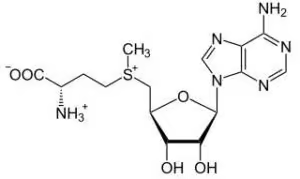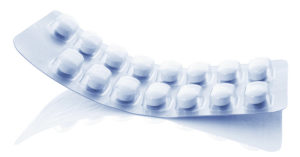Table of Contents
Key Takeaways
- SAM-e (S-Adenosyl Methionine) is a naturally occurring amino acid crucial for brain health and bodily functions.
- It regulates neurotransmitters, impacting mood, memory, and behavior.
- SAM-e treats depression and anxiety effectively, faster than traditional antidepressants and without their side effects.
- SAM-e enhances neuroplasticity, brain-cell membrane fluidity, and muscarinic receptors, leading to improved learning, memory, and mood.
- SAM-e supplementation with B vitamins at recommended dosages of 400 to 1600 mg daily benefits conditions like depression, anxiety, osteoarthritis pain, fibromyalgia, and chronic liver disease.
SAM-e (S-Adenosyl Methionine, Ademethionine, Adomet) is the naturally-occurring amino acid methionine bound to an ATP molecule. And is found in nearly every cell in your body.
SAM-e helps produce and breakdown the neurotransmitters acetylcholine, dopamine, serotonin, norepinephrine and melatonin in your brain. SAM-e maintains cell membranes and plays a role in a healthy immune system.
Studies show that SAM-e is very effective in treating depression without the side effects of prescription antidepressants. And while pharmaceutical antidepressants can take from 6 to 8 weeks to begin working, SAM-e can work much faster.
The latest research shows that SAM-e can be anti-anxiety, reduces pain including in fibromyalgia, and can improve learning, memory and mood.
SAM-e helps:
- Neuroplasticity. SAM-e is involved in the formation of myelin that surrounds and protects axons. And SAM-e can improve brain-cell membrane fluidity. Enhancing the function of neuroreceptors.
- Neurotransmitters. SAM-e is involved in the synthesis of acetylcholine, dopamine, serotonin, and norepinephrine. Helping to normalize mood, moderate behavior, and elevate emotions.
- Neuroprotectant. SAM-e helps produce the powerful antioxidant glutathione through a process called transsulfuration. SAM-e helps stabilize cell membranes and promotes the secretion of bile. And through a process called aminopropylation, SAM-e is converted into the antioxidant methylthioadenosine, which has anti-inflammatory and analgesic (pain-relieving) properties.
What is SAM-e?
SAM-e (S-Adenosyl Methionine) is a naturally occurring coenzyme that plays many critical roles in your body.

SAM-e is made from methionine and ATP (adenosine triphosphate) during a cycle that recycles the amino acid homocysteine. This cycle requires Vitamin B6 and B12 and folate (B9) to work properly.
SAM-e is a precursor to the crucial antioxidant glutathione which is used in your brain and liver. When glutathione levels drop in your body, liver damage from oxidative stress begins within seconds of exposure to alcohol or toxins.
SAM-e is a methyl donor that contributes to several essential processes in your brain. As a methyl donor, SAM-e is involved in the production and recycling of hormones, cytokines, and the neurotransmitters acetylcholine, dopamine, norepinephrine, and serotonin.
This methyl donor process is call ‘methylation’, and contributes to gene expression. Affecting how your cells work and communicate including your cell DNA.
SAM-e modifies important molecules in cell membranes that control communications within and between brain cells. SAM-e boosts the number of muscarinic receptors in certain parts of your brain which are critical to this cellular communications network.
SAM-e is used to treat depression, anxiety, osteoarthritis pain, fibromyalgia, and chronic liver disease.
SAM-e is sold as an OTC dietary supplement in the United States and Canada. And as a prescription drug in several European Union countries, and Russia. SAM-e is marketed under the brand names Adomet, Gumbaral, Samyr, Heptral, Agotan, Donamet, Isimet and Admethionine.
How does SAM-e work in the Brain?
SAM-e boosts brain health and function in several ways. But two in particular stand out.
- SAM-e helps alleviate depression. SAME-e is one of the main building blocks your brain needs to produce the neurotransmitters acetylcholine, dopamine, serotonin, norepinephrine and melatonin. By raising the levels of dopamine in your brain, SAM-e helps enhance memory, motivation and learning.
Researchers at the West Los Angeles VA Medical Center studied the antidepressant effect of oral SAM-e in a randomized, double-blind, placebo-controlled trial for 15 patients with major depression.
The researchers found that SAM-e is a safe, effective antidepressant with few side effects and a rapid onset of action. And may be useful for those who cannot tolerate prescription tricyclic antidepressants.[i]
- SAM-e directly influences neuronal signaling. SAM-e increases the number of muscarinic receptors in the hippocampus. We have two kinds of acetylcholine (ACh) receptors in our brain. 1) Nicotinic receptors and 2) Muscarinic receptors
Most of the nootropics we investigate here at Nootropics Expert influence nicotinic receptors and ACh. Muscarinic receptors have a very different mechanism of action. They are part of a large family of G-protein-coupled receptors (GPCRs) which are used as an intracellular secondary messenger system.
Your brain has a very complex system of control to regulate different processes going on in different cells at different times. For this to work, there must be a sophisticated means of communication between cells.
GPCRs and their G proteins provide this intercellular communication. And form one of the most important signaling systems in your brain. They are involved in nearly every aspect of your physiology and behavior.
G proteins work by binding neurotransmitters, hormones, growth factors, cytokines, odorants and photons at the cell surface to the GPCR, and activating that receptor. Everything you see, hear, smell, or taste goes through this signaling process.
And SAM-e increases the number of these muscarinic receptors in parts of your brain, including your hippocampus. In one study, aged rats were given SAM-e for 30 days. Supplementation with SAM-e restored the number of muscarinic receptors to levels found in the same areas in young animals.[ii]
Supplementing with SAM-e to increase muscarinic receptors in your brain can boost neuroplasticity and increase learning, memory, mood and even smell and vision.
How things go bad
You have healthy levels of SAM-e throughout your body when you’re young. But as you age, your body makes less of it. This is why young people bounce back from difficult experiences more easily. They’ve got higher levels of dopamine and a higher pain threshold than adults.
SAM-e is a major methyl donor in your body. It is involved in the biosynthesis of hormones, neurotransmitters, proteins and phospholipids.[iii]
SAM-e participates in a sequence of events involving folic acid (folate) and Vitamin B12. Folate converts to 5-MTHF (5-methyltetrahydrofolate) which converts freely circulating homocysteine back into the amino acid Methionine (using Vitamin B12). L-Methionine then binds to an Adenosine group from ATP to create SAM-e.
SAM-e is then able to donate methyl groups (called methylation) to a variety of reactions including the production and breakdown of the neurotransmitters dopamine, serotonin, norepinephrine and melatonin in your brain.
This methylation process degrades SAM-e into S-Adenosylhomocysteine. Which is then fed back into this cycle from the beginning. This process is referred to as a ‘one-carbon cycle’.
If you don’t have enough folate or Vitamin B12 available, this SAM-e methylation process breaks down. And the result can be depression, brain fog, poor recall and memory, and pain.
This lack of folate and Vitamin B12 can affect you regardless of age. This is a big enough problem that the Canadian government mandated folate fortification of all flour, and some corn and rice products to address this issue in 1998.[iv]
Low levels of SAM-e, methylfolate, Vitamin B6 and B12 can lead to all kinds of problems. And genetic defects that don’t allow the use of these important vitamins can result in the same symptoms.
↓ Cognition, memory, recall, and mood diminish
↓ Methylfolate, Vitamin B6 & B12 absorption declines
↑ Homocysteine levels rise
↑ Pain levels rise
↓ Mental health, language and fine motor skills decline
All of these changes in brain energy metabolism are contributing factors to neurodegenerative diseases, including Alzheimer’s, Parkinson’s, ALS, epilepsy, dementia, and other cognitive symptoms.
But even if you’re not concerned with genetic defects, a lack of B-Vitamins, or the effects of aging, SAM-e can help.
SAM-e benefits
Stress-related disorders like anxiety, major depression and PTSD are some of the most debilitating illnesses known to man. And if you’re reading this, and dealing with any of these, supplementing with SAM-e may help.
To cope with stress requires changes in the expression of “immediate-early genes” in your hippocampus. The same area of your brain you use for learning and memory.
Stressful events result in epigenetic (gene) modifications within ‘immediate-early genes’ in your hippocampus neurons. DNA methylation acts to suppress the expression of these genes. This is where SAM-e comes in…
SAM-e is a methyl donor for the enzyme that methylates your DNA. When SAM-e levels are high enough, a stressful event will not result in DNA de-methylation.
Instead, a stressful event enhances DNA methylation of ‘immediate-early genes’. Which suppress their expression and allows you to adapt in a healthy way to this stressful situation.[v]
SAM-e is a powerful antidepressant. In 2005, researchers combed through the databases of Medline, Psychinfo, AMED, and Cochrane Controlled Trials Register. And collated the findings of randomized, controlled trials studying SAM-e for depression through to September 2001.
The team concluded after analyzing all the clinical evidence that SAM-e was effective in treating major depression in adults.[vi]
SAM-e is also a potent pain-killer. A recent study looked at 56 people with arthritis in their knees for 16 weeks. One group took the COX-2 inhibitor Celebrex while the other group took SAM-e.
Researchers found that SAM-e was as effective as Celebrex at eliminating pain. And without the potential side effects of heart attack or stroke that can be caused by using Celebrex.[vii]
Another study on the effect of SAM-e with 17 fibromyalgia patients confirmed a close relationship between primary fibromyalgia and psychologic problems including depression.
SAM-e treatment improved the depressive state of these patients. And SAM-e was found to be an effective and safe therapy in the management of fibromyalgia.[viii]
How does SAM-e feel?
For some, supplementing with SAM-e can be life-changing.
SAM-e can have a profound effect on emotions, depression, and feelings of anxiety. You may experience improved concentration, energy, alertness, and feelings of well-being. Even vision can become clearer.
Once you start supplementing with SAM-e, you should experience at the very least, a general sense of well-being.
SAM-e works particularly well for those who deal with depression or anxiety. Neurohackers report that they no longer have panic attacks. And the feeling of doom is gone.
Adding SAM-e to your nootropic stack can improve sociability, and not feeling overwhelmed by life. Brain fog lifts and thinking is clearer and faster.
Others say that the “dark cloud has lifted”, and all the negativity and stress is gone. Things that normally would irritate are just brushed off, and you move on.
One big word of caution: SAM-e needs Vitamins B6 & B12 and folate to work. Or supplementing with SAM-e may be a waste of time and money because without adequate levels of these B-Vitamins it will not provide any benefit.
You’ll notice reference to B-Vitamins several times in this article on SAM-e. It is that important. Use Vitamin B6 & B12 and folate every day that you supplement with SAM-e. Or use a B-Complex formula that contains methylfolate (B9) (avoid folic acid).
SAM-e Clinical Research
SAM-e Lifts Mood
We have made significant progress in the last 100 years in diagnosing and treating depression. And yet, 10’s of millions still suffer from depression. In 2014, an estimated 15.7 million adults in the United States had at least one major depressive episode in the past year.[ix]
In the United States, one in ten Americans are using antidepressants.[x] I don’t have statistics from other countries but I suspect many have similar problems. Unfortunately, antidepressants only work 30 – 50% of the time. And often come with a host of side effects.
One reason that many people continue to suffer from depression is that most doctors are not aware of the link between homocysteine and depression.
If you’re dealing with depression and have had little success with antidepressants, you may have something as simple (and as serious) as a folate deficiency. Or low levels of Vitamin B12. Studies show a link between folate deficiency and impaired metabolism of serotonin, dopamine, and norepinephrine.
One study looked at 46 patients with severe depression. 24 of these patients had raised levels of homocysteine. And significantly lower levels of folate, SAM-e, and other metabolites.
The researchers concluded that looking at total homocysteine levels could be a measure of depression. When it is caused by a folate deficiency, impaired methylation (SAM-e), and poor neurotransmitter metabolism (SAM-e). And a potential benefit to simply using vitamin replacement to treat severe depression.[xi]
Or supplementing with SAM-e to treat depressive symptoms.
SAM-e for ADHD in Adults
Ritalin and Adderall are thought to be the most effective treatment in children and adults with ADHD. These stimulants work by potentiating both dopamine and norepinephrine at the synaptic cleft. But stimulant meds for ADHD come with side effects.
SAM-e acts as a methyl donor and is involved in many metabolic pathways. It has both adrenergic and dopamine receptor agonist activity.
A research team at the University of California used SAM-e with subjects diagnosed with Adult ADHD in a 9-week double-blind, placebo-controlled trial.
The research team found that 75% of the patients had a significant improvement in ADHD symptoms while using SAM-e. And the 25% who did not respond to SAM-e, did not respond to Ritalin either.[xii]
SAM-e Treats Depression
Scientists at the US Department of Health and Human Services conducted an analysis of 102 individual studies in 25 databases on SAM-e and depression in 2002. The report distilled data gleaned from published studies conducted around the world up to 2002.
This comprehensive report is called, “S-Adenosyl-L-Methionine for Treatment of Depression, Osteoarthritis, and Liver Disease.” The researchers found that SAM-e is just as effective as standard antidepressant drugs at treating depression.
The agency concluded, “Treatment with SAM-e was equivalent to standard therapy for depression”.[xiii]
SAM-e Recommended Dosage
Recommended dosage of SAM-e for nootropic benefit is 400 mg per day.
SAM-e for depression: 400 – 1600 mg daily in divided doses
SAM-e for bone and joint health: 200 – 1200 mg daily in divided doses
SAM-e for liver function issues: 1600 mg daily in divided doses
SAM-e for alcoholic liver disease: 600 – 1200 mg daily in divided doses
Some research and many user reports suggest that once positive effects are achieved, SAM-e doses can be reduced. Some report benefit with as little as 100 mg of SAM-e daily.
Studies show that SAM-e should be consumed with B-Vitamins. When SAM-e donates its methyl group, it breaks down into homocysteine. Elevated homocysteine levels are associated with increased heart disease, birth defects and depression.
Choose a bioactive B-Complex to use with SAM-e. Like the high quality B-Complex like Performance Lab® B-Complex which contains therapeutic amounts of each of the B-Vitamins you need while using SAM-e.
In order to prevent homocysteine accumulating, logic tells us based on its mechanism of action that sufficient levels of B-Vitamins must be present to convert homocysteine into the potent antioxidant glutathione.
Take SAM-e on an empty stomach and an hour before eating any food. SAM-e is best digested in your intestines and not your stomach. Not letting SAM-e settle into your digestive tract could cause stomach upset.
SAM-e Side Effects
SAM-e is produced naturally in your body. So is considered well-tolerated and safe.
If you have bipolar disorder, you could develop mania when supplementing with SAM-e. So check with your doctor before using SAM-e.
If you’re on antidepressant medication, you should check with your doctor before supplementing with SAM-e.
High doses of SAM-e can cause gas, upset stomach, diarrhea, constipation, dry mouth, headache, dizziness, anxiety or skin rashes. SAM-e may also trigger an allergic reaction in some people.
Type of SAM-e to buy
SAM-e is available in 200 and 400 mg tablets.
For optimal effects with SAM-e, stable, enteric-coated tablets are recommended. SAM-e should be taken on an empty stomach, either one hour before or two hours after meals.
SAM-e is highly unstable so check expiration dates. And you should get tablets that are packed in sealed, gel-packs for freshness.
Avoid SAM-e in powder form as you’ll likely be unsatisfied with the results.
Nootropics Expert Recommendation
SAM-e 400 mg per day
 I recommend using SAM-e as a nootropic supplement.
I recommend using SAM-e as a nootropic supplement.
Your body does make some SAM-e on its own. But SAM-e levels decrease as we age. And you cannot get SAM-e from food.
SAM-e is critical for the methylation process needed for making important neurotransmitters including acetylcholine, dopamine, serotonin, norepinephrine and melatonin.
SAM-e is also involved in the cycle which produces the critical antioxidant glutathione. And it’s involved in maintaining brain cell membrane integrity and fluidity.
SAM-e increases muscarinic receptors in your hippocampus which boosts the activity of acetylcholine and other critical neurotransmitters in your brain. Leading to improved learning, memory and mood.
SAM-e is especially helpful if you’re dealing with depression. Or having difficulty coping with any kind of stress.
We suggest a dose of 400 mg daily. It may take a while for SAM-e to build up in your system. So be patient. Once you’re achieving the affects you want from SAM-e, you can eventually try scaling back your dose to 100 or 200 mg.
SAM-e needs Vitamins B6 & B12 and folate to work. Or SAM-e may not provide the benefit you are looking for. Most integrative medicine doctors and naturopaths recommend stacking a high quality B-Complex when using SAM-e. So make sure you stack SAM-e with the B-Vitamins listed above, or a good Vitamin B Complex formula that uses methylfolate (NOT folic acid).
A high quality B-Complex containing these bioactive B-Vitamins like the Performance Lab® B-Complex .










Join The Discussion - 404 comments
Adam
April 20, 2022
Hi David! I’m 21 and my dopamine is very low. 500mg x3 of NALT don’t do much for me, I’ve ordered L-Dopa (just to try, as far as I know I don’t have to use NADH to convert tyrosine to L-Dopa, so in theory it should be faster and more strong dopamine boost)
I suplement all dopamine cofactors beside SAM-e. Will I gain anything from SAM-e in such a young age?
God bless you David!
David Tomen
April 22, 2022
Adam, I doubt you need SAM-e. But you definitely need Vitamins B6, B9 and B12 along with magnesium. So try a bioactive B-Complex like this one: https://amzn.to/36Bm7ZU (Amazon), and a magnesium supplement like this before bed: https://amzn.to/3K0xA33 (Amazon)
Zanzara
April 16, 2022
Hi David,
I have been talking SAM-e on and off for over four years, and it has made a remarkable improvement in my mild depression and arthritic knee. So, I was shocked and frustrated when I came upon a newly published article by the University of Manchester that says biologists have apparently discovered SAM-e could be toxic. They are claiming it breaks down into adenine and methylthioadenosine , which is a toxic substance.
Can you offer some insight into this claim? I would really like to continue taking SAM-e for my mental and physical.health. I have included a link to the article:
https://www.manchester.ac.uk/discover/news/common-supplement-could-be-too-toxic-scientists-warn/
Thanks kindly,
Zanzara
David Tomen
April 18, 2022
Zanzara, you have to wonder what that authors of that article agenda is and the very first sentence, “should not be used until it is shown to be safe”. Are they kidding?
I have clinical studies going back to 1990 for use in humans. If it has been working for you then keep on using SAM-e. And please do not lose any sleep over something published by an academic whom you do not know. And likely is pissed because he can’t get a job with a supplement manufacturer.
Zanzara
April 22, 2022
Hi David,
Thank you so much for your words of reassurance. I have been feeling quite troubled since reading that article and my attempt at discontinuing SAM-e cold turkey was not pleasant, to say the least.
With gratitude,
Zanzara
Alex
April 5, 2022
Hi there, I’m just wondering how SAM-e differs from other methyl donors eg DMG, as I note it only has one methyl group where is the DMG has two I’m guessing it’s nowhere near as simple as that but I’m hoping you will be able to tell me what the differentiating factors are. Also should it be stored in the fridge? I note you mention poor stability
Thnaks in advance
David Tomen
April 5, 2022
Alex, it’s not a complete explanation of how methylation works but it’ll get you started: https://nootropicsexpert.com/vitamin-b9-folate/. Look at the section called “Problems with MTHFR“.
If you feel like taking a really deep dive into SAM-e and 1-carbon cycle see this: https://www.ncbi.nlm.nih.gov/pmc/articles/PMC5794704/
SAM-e does not need to be refrigerate. But it’s very unstable as a supplement and good quality comes in bubble packs to keep it as fresh as possible. Avoid SAM-s supplements that are loose in a bottle.
F Johnson
March 16, 2022
Are there any known contraindications for taking SAM-e and Dopa mucuna at the same time or on the same day? I’ve been unable to find any information about taking these two supplements together. I have been taking 800mg SAM-e for many months and am considering adding Mucuna pruriens 800mg/15% L-Dopa.
Thank you for your very informative article, the best I’ve read so far and I’ve read a lot.
David Tomen
March 17, 2022
No problem combining SAM-e with Mucuna Pruriens. But why are you considering using Mucuna?
F Johnson
March 18, 2022
I’m working out non-prescription options for addressing depression and anxiety after having tried more than 10 pharmaceuticals, all with disasterous results.
I am a caregiver for my husband who has mild dementia. I’m responsible for more of our lives as we traverse this journey, which sometimes leads to feeling overwhelmed and excessively anxious.
In addition to SAM-e (800mg, which is working better now that I’m adding an appropriate Vit B complex with meals, thank you) I am taking Lion’s Mane for better mental focus and clarity. I do not take SAM-e and Lion’s Mane at the same time. I’ve read that Lion’s Mane combined with Mucuna puriens is helpful for anxiety.
My experience with SAM-e is that it keeps my deep depression at bay. I don’t want to jeopardize that success by taking something that might not be a good fit with it.
David Tomen
March 19, 2022
You should be safe using Mucuna Pruriens. But that herb is used for increasing dopamine. I think you’ll find L-Tyrosine easier to use and more forgivable when it comes to figuring out the right dose for you.
F Johnson
March 20, 2022
Thank you. I appreciate the suggestion.
William T
January 28, 2022
Would there be a risk of serotonin syndrome when taking 5 mg deprenyl twice a week and SAM-e 400 mg daily.
David Tomen
January 29, 2022
William, it could be a problem but it hasn’t been reported in studies. Here is a list of all known contraindications Selegiline: https://www.drugs.com/drug-interactions/selegiline-index.html
Ron
December 31, 2021
Hi David,
Has there been any studies for SAMe use in children?
I ask, because it looks like it could be effective for ADD. If so, could it be beneficial for hyperactivity as well?
Ron
David Tomen
December 31, 2021
Ron, there are plenty of studies using SAM-e with children and depression. But not specifically for ADD or ADHD.
Ron
August 7, 2022
Thank you!
Phil
December 29, 2021
Hi David, hope it’s been a pleasant break for you.
You reference in the article about people lowering SAM-e levels?
I’ve been up at 1600mg but recently feeling a bit too hyped up and been doing 4-800 a day – maybe still too much.
Thinking to do 100-200 a day or 400 every other day? Any insight would be ace or where you got that info from.
Appreciate it’s a less stressful time of year (sort of!).
SAM-e felt like the first nootropic to do ‘something’ so thankful for it!
David Tomen
December 29, 2021
Phil, this “holiday” was not much of a holiday here because we moved into a new house. So, there hasn’t been any time to relax as you can imagine. But in the end it is worth the stress.
I did make the statement, “Some research and many user reports suggest that once positive effects are achieved, SAM-e doses can be reduced. Some report benefit with as little as 100 mg of SAM-e daily.”. The user reports would have come from user reviews under a bestselling SAM-e supplement sold on Amazon or one of the other vendors. But I can’t remember where the “some research” reference came from.
Best thing to do is try a lower dose and see if it works for you. Keep in mind your system naturally produces SAM-e as well. So you are “supplementing” what is naturally occurring in your body.
Nancy
December 25, 2021
Dear David,
Is it OK if I combine SAMe and Dopa Mucuna?
I use Dopa Mucuna 4 times per week it gives me great mental strength
Thank you very much
David Tomen
December 26, 2021
Nancy, SAM-e should support the use of Mucuna Pruriens because it helps with the synthesis and breakdown of dopamine and norepinephrine. Both of which are produced when using L-DOPA as a precursor to dopamine synthesis.
Nancy
December 27, 2021
Thank you for all your help
Best wishes for 2022